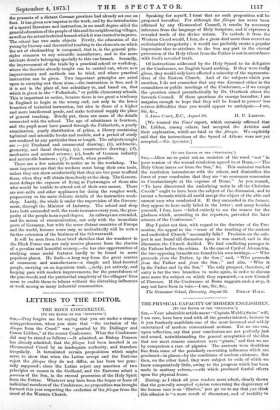[TO THE EDITOR OF THE "SPECTATOR. " ] Silt, —Allow me to point
out an omission of the word " not" in your version of the second resolution agreed to at Bonn,—" The Holy Ghost issues not from the Son," &c. This omission renders the resolution inconsistent with the others, and diminishes the force of your conclusion that they are "an enormous concession to Constantinople at the expense of Rome." As you remark, "To have discovered the underlying unity in all the Christian Creeds" ought to have been the subject of the discussion, and to invent a formula which all could accept the object of the able and earnest men who conducted it. If they succeeded in the former, they appear to have sadly failed in the latter ; and many besides yourself, I fear, have "failed entirely to see the reason for the gladness which, according to the reporters, pervaded the later seances of the Conference."
May I point out that, with regard to the doctrine of the Pro- cession, the appeal to the "sense of the teaching of the ancient and undivided Church" necessarily fails ? Precision on the sub- ject is not found till discussion upon it was started, and in the discussion the Church divided. We find conflicting passages in the Fathers before the schism. In the case of Cyril of Alexandria, the two opposing formulae are found in his own writings,—" Who proceeds from the Father, by the Son ;" and, " Who proceeds from the Father and from the Son ; " and also, " Who is by the Father and by the Son." The only prospect, therefore, of unity is for the two branches to unite again, in order to discuss once more the subject on which they separated,—a new Council of Florence. If the Conference at Bonn suggests such a step, it may not have been in vain.—I am, Sir, &c.,
The Grammar School, Daventry, August 31. PHILIP HALE.






























 Previous page
Previous page